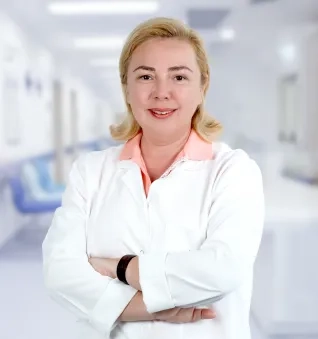Alo Yeditepe
Alo Yeditepe
The Game of Chromosomes
Thousands of genes included in chromosomes contain many physical and mental characteristics of the fetus developing in the womb. A problem that occurs here can lead to genetic disorders.
Chromosomal anomalies refer to structural or numerical changes that occur in a chromosome. They can be caused by a deficient or fractured chromosome, the presence of an excess chromosome, or an abnormally combined chromosome. As in the whole world, the most common chromosome disease in Türkiye is 'trisomy' 21, also known as Down Syndrome. Most of these diseases can be diagnosed in the womb. For this reason, regular follow-up and screening tests should not be neglected during pregnancy.
Saying that ”the code of a healthy life is hidden in our genetic structure," Yeditepe University Genetic Diseases Assessment Center Director and Physician in Charge Assoc. Dr. Ayşegül Kuşkucu answered our questions on the subject.
When you find a chromosomal anomaly what kind of process starts for both the mother and the baby?
Screening tests for chromosomal abnormalities are routinely performed from the first trimester of pregnancy. As a result of these screenings, when there is a suspicion of chromosome disease in the fetus, an invasive procedure is performed to analyze the baby's chromosomes for a definitive diagnosis. Those invasive procedures can be chorionic villus sampling, amniocentesis, or cordocentesis according to the week of pregnancy. However, these procedures are not recommended for every pregnant woman because they can lead to miscarriage even at a small rate. That's where the importance of screening tests comes into play, for whom and when should we recommend them so that they have been recommended most accurately?
Considering the screening tests applied in routine practice, for most risky pregnant women, invasive methods are recommended. However, their false positivity rate is high, namely although the risk may seem increased, the baby is actually healthy. Thus, unnecessary invasive procedures are applied to most pregnant women. NIPT, on the other hand, is a test with a low false positivity rate and requires fewer non-invasive interventions. If there is a known genetic disease or carriage in the family, it is necessary to determine whether the baby is sick by recommending invasive methods, regardless of screening tests.
Is it possible to avoid transferring a faulty gene to a baby?
Yes, it is possible. If we know the gene and the fault, there is a chance for families to have healthy babies through preimplantation genetic diagnosis. In order to apply this method, assisted reproductive techniques (IVF) should be used. Genetic fault checks are performed on cell samples taken from each of several developing embryos. The embryo determined not to carry the fault or disorder that the family carries is transferred to the mother.
What tests should those with a genetic history in their family undergo before having a baby?
If there is a familial condition, first of all, one should apply to medical genetics outpatient clinics. Together with a genetic counselor, the type of disease, type of inheritance, and carriage are determined, and the baby's probability of developing the disease is calculated. Then, the things to be done before and during pregnancy for this risk are planned. These tests are specific to the disease.
In the past, such tests used to go abroad, but now there are genetic diagnosis centers in Turkey as well. Does this situation bring advantages in terms of time and cost?
Many centers still send these tests abroad. The reason, on the other hand, is the lack of people who have experience with the necessary devices, technology, and information. When it is performed in Türkiye, we have a chance to evaluate the results. The tests going abroad, on the other hand, return as analyzed. When an adverse condition appears in the results, families and sometimes obstetricians may need support for the later stages of pregnancy. Now, couples in our country can get genetic counseling before having a test. The fact that the tests are conducted in Türkiye can also prevent situations such as repeating the tests or collecting insufficient samples.
Does it have anything to do with consanguineous marriage?
Consanguineous marriage has nothing to do with chromosome diseases. Genetic problems that arise due to consanguineous marriages occur as a result of an impairment in the structure of only one of the thousands of genes located on chromosomes. This is called "single gene diseases" and occurs more often in consanguineous marriages, even being passed on to subsequent generations. Chromosome diseases are not inherited and occur by chance. In other words, every baby to come into the world has such a risk. The risk of having a chromosomal disease is always present, and parents do not have to be relatives for such diseases to occur.
"The code is hidden in our genetic structure"
- Are research in the field of genetics promising for the future?
In addition to the rapid progress in both device technologies used for genetic studies and communication, this branch of science has become important in all fields of medicine thanks to humankind's passion for the unknown. Because the code of a healthy life, including a person's entire structure, future, possible diseases, and the drugs to be developed for their treatment, is hidden in our genetic structure. Therefore, it is promising, even very promising, for the future.
Press Coverage: milliyet.com
About
Faculty and Year of Graduation:
Istanbul University Faculty of Medicine, 2001
”
See Also
- What is Genetic Testing? In Which Situations Is It Performed?
- Genetic Tests in Cancer
- Paternal Prostate Cancer is a Risk Factor for Breast Cancer in Daughter
- Cancer Predisposition Can Be Determined With This Test
- Genetic Testing Directs Our Health
- The Vicious Cycle of Generations with SMA Can Be Overcome with Screening Tests
- Genetic Diseases Can Be Detected by a Blood Test in the Womb
Alo Yeditepe




